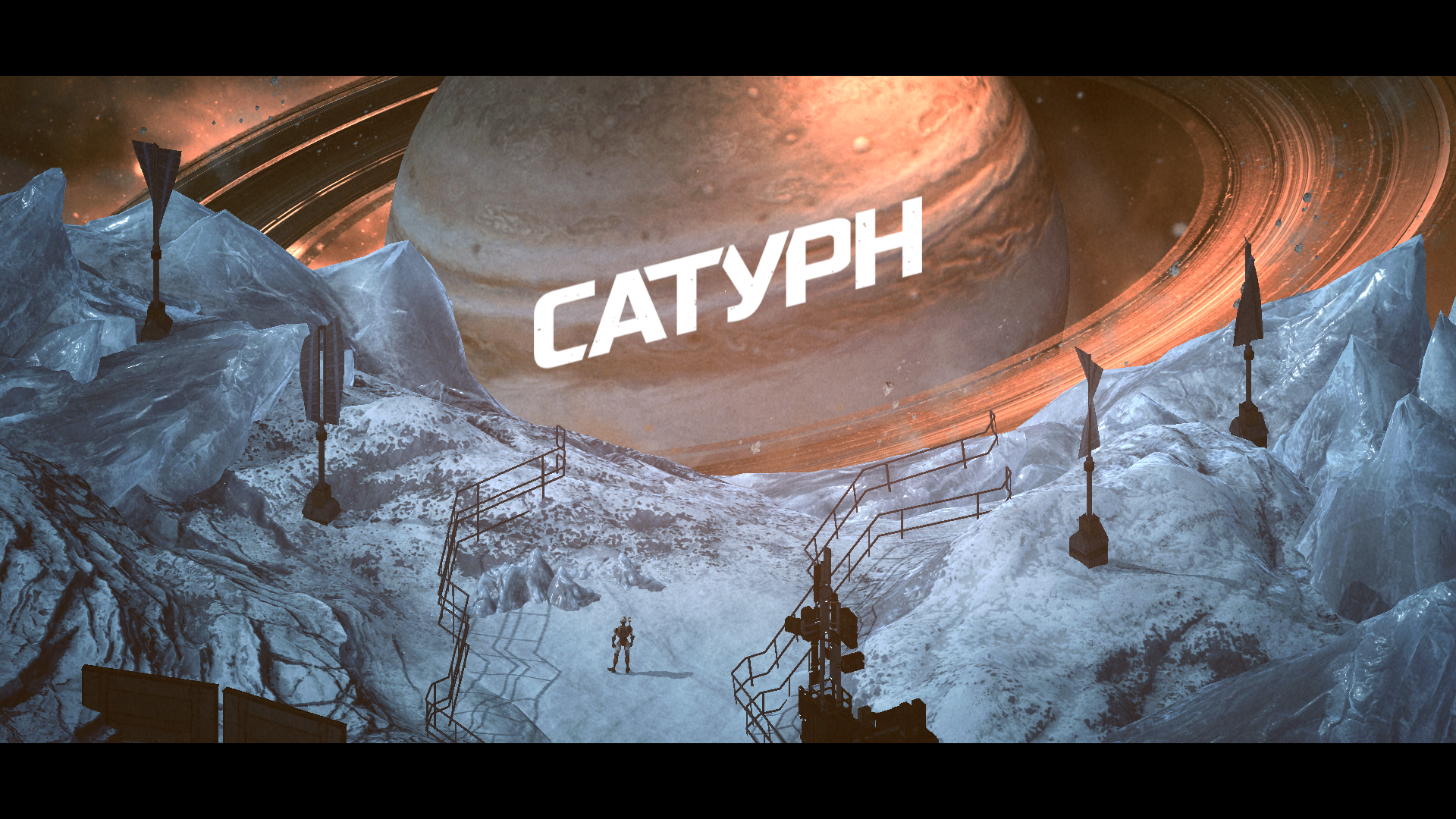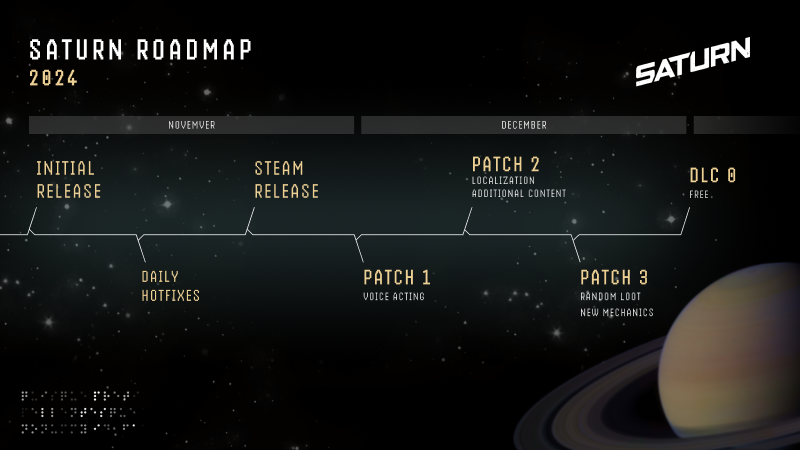Saturn Video Game Review: Three Days to Save the World of Noon
 Russian-language gamedev, after its mid-2000s takeoff, fell into an ancient Roman decline, but in recent years it has increasingly reminded us of its proud existence. The role-playing game "Saturn" from St. Petersburg developers Ninsar Games (their ranks include veterans who worked on Divinity: Original Sin 2 and Baldur's Gate 3) appeared as a product of cultural and social policy: it was financed by the Institute for Internet Development and is distributed free of charge. Fortunately, in this particular case, the saying about free cheese did not work. But it is also too early to uncork the champagne. You can limit yourself to a bottle of good kvass.
Russian-language gamedev, after its mid-2000s takeoff, fell into an ancient Roman decline, but in recent years it has increasingly reminded us of its proud existence. The role-playing game "Saturn" from St. Petersburg developers Ninsar Games (their ranks include veterans who worked on Divinity: Original Sin 2 and Baldur's Gate 3) appeared as a product of cultural and social policy: it was financed by the Institute for Internet Development and is distributed free of charge. Fortunately, in this particular case, the saying about free cheese did not work. But it is also too early to uncork the champagne. You can limit yourself to a bottle of good kvass.
Arkady and Boris Strugatsky
"Predatory things of the century"
—
Why are you so unwilling to think? How can you not understand that the world is huge, complex and fascinating? Why is everything so simple and boring to you?
 You can choose three talents from the past
You can choose three talents from the past
A mysterious signal is being transmitted from somewhere on Saturn's satellites, forcing the robots of the human civilization of the near future to attack their creators. There are few clues, crazy iron things are around, resources are limited, but engineer Akim is trying to get to the bottom of the truth. And then information comes in that in three days it will be too late: the end of the world and the human race will happen, no more and no less.
The developers claimed that they were inspired by the books of Stanislav Lem, Alexander Belyaev and the Strugatsky brothers. We didn’t notice Belyaev here, Lem is debatable, but the presence of Arkady and Boris Natanovich is felt. The scenery, technology, and general atmosphere of the game vividly recall the World of Noon — the universe where many of the Strugatskys’ books took place, including “Interns,” “Inhabited Island,” and “Hard to Be a God.” In terms of feel, the Ninsar Games game is closest to the story “Predatory Things of the Century.” Here, too, there is a decorous, well-appointed, and seemingly cozy world in which a threat is quickly guessed, not entirely clear, but mortally dangerous.
 The epic sketch from the beginning is, unfortunately, a rarity; during the game the camera hangs in isometric view, and you can’t move it far away
The epic sketch from the beginning is, unfortunately, a rarity; during the game the camera hangs in isometric view, and you can’t move it far away
Akim is not only an engineer, but also an operator of extraterrestrial robots - such mechanisms are controlled remotely via the "Reflection" protocol. While the operator controls the robot in a safe and well-heated room, the obedient mechanism studies the dangerous corners of the next moon. In the event of the death of the ward, the operator simply takes the next victim out of the hangar. However, to access the next moon, you need a code that is given to you by the story NPCs, and you still need to get to them.
It's a different matter when Akim has to personally carry out quests on Earth, in this case, in the area of the resort town of Sochi. The nasty signal has already reached here, and dozens of "crazy" robots are rushing to break the protagonist's ribs. So, if Akim dies, all progress will roll back to the morning of the current day. And this is a long journey that must be started over again.
 Akim's house is a rich and cozy apartment. There are a lot of useful things scattered around. There is a pistol on the table nearby
Akim's house is a rich and cozy apartment. There are a lot of useful things scattered around. There is a pistol on the table nearby
The core of Saturn's gameplay is a combination of role-playing and questing. It requires a lot of wandering, exploring and searching, just like in the golden age of quests. And this decision by the developers should be welcomed. Hidetaka Miyazaki with his Souls made all RPG fans train their mongoose reactions, but sometimes you want something leisurely, even meditative. In addition, Saturn confidently maintains the intrigue: you want to uncover the secret of the signal, and the lack of information is perceived as a challenge.
From the role-playing game, you will find here a choice of initial talents that give an increase to some characteristics and penalize others. The characteristics themselves cannot be changed, and "Dexterity" and "Charisma" will grow automatically throughout the game, like in an old JRPG. You can look for useful consumables in locations, and it would be good to buy a new barrel or a close combat unit from merchants. True, the economic system in the game is quite harsh: some machine gun with nuclear bullets costs 5,000 rubles (yes, rubles. The national currency is immortal!), and after three or four hours of play, a pitiful one and a half thousand will rustle in your pocket.
 The Japanese corporation's building is empty. A lonely merchant is bored nearby. Prices are too high
The Japanese corporation's building is empty. A lonely merchant is bored nearby. Prices are too high
The inventory soon accumulates a lot of items. Most of them are consumables with a short duration and a variety of buffs. It is unclear why the developers did not even try to adhere to logic, giving eggplant caviar the effect of "+3 to luck". But this does not fit well with the overall serious tone of the game. Also, incomprehensible things happen in the inventory: you can use cartridges, for example, for a laser rifle, without having the rifle itself. Just click on the ammunition, and it begins to disappear. Whether Akim throws them away or eats them is another of the mysteries of "Saturn".
The combat system claims to be original, but it turns out so-so. When you collide, the game pauses, but the opponents do not take turns, as in the recent Baldur's Gate 3, but move simultaneously when you perform an action. Time periods are interrupted every couple of seconds, but it still won't work to calculate subtle tactics. You can exchange shots with the enemy, and time will freeze when the enemy bullet is halfway to your protagonist - in this case, you will have time to step aside (in 40 years, engineers will be no less cool than Neo in the Matrix!). Or it can be like this: the bullet will fly to you, hit Akim in the brave forehead, and only then will time stop. As a result, there are fewer tactical tricks in the game than we would like: you need to keep your distance and, if possible, cover yourself from the shots of some robots with the iron bodies of others - friendly fire in "Saturn" works well.
One of the main features of the game is the continuous flow of time. Conditionally continuous. Each move between locations takes Akim several hours. To restore health and remove negative effects, you can sleep at home, but this will also take at least three hours. And the player has only three game days in reserve. Then the denouement will happen and in any case the final credits will appear. This idea is very controversial. What worked well in the hilarious action Dead Rising, in a role-playing game raises uncomfortable questions. Akim travels a lot and spends precious hours for each visit to the merchant. In an RPG, I would like to feel less constrained, but "Saturn" constantly reminds us of the approaching finale.
Many design decisions raise uncomfortable questions for the Ninsar team. The locations are small but confusing, with bridges, dead ends and several exits. But there is no map, you need to study the area in runs there and back. The number of interactive objects is large, and the backlight, which has worked reliably since the times of Diablo, is also absent in the Saturn. What remains is dull pixel hunting, and it should have been banned at the legislative level 30 years ago. Finally, the navigation in the game is shot in the head: when moving between locations, you can only read the names of neighboring territories. And which of the dozen locations marked with icons is the very library where the obligatory quest leads, can only be found out by trial and error.
 It's cold on the moons. There's no air. And it's boring.
It's cold on the moons. There's no air. And it's boring.
There are other shortcomings in the game. The process sometimes displays a message about automatic saving of progress, but there is no way to load this moment, and the hero's death throws him back to the same house. There are some unfortunate jokes like mentioning the Covid virus, but this is a common disease of post-Soviet gamedev. Leveling up is boring, new levels only add percentages to the already available skills. The character is controlled only by the mouse, although even in such an ancient classic as Neverwinter Nights, the mouse was duplicated by the familiar WASD key combination. There are very few types of enemies, even though they are armed with different barrels. And the bullets flying at the speed of a thrown snowball do not inspire confidence.
The developers promised to actively support Saturn until the end of 2024, making edits and adding content. But this time is simply not enough to reveal the game's potential. And the potential is noticeable.
 New robots are ready to go to slaughter. That is, to reconnaissance
Saturn has an unsettling atmosphere, a plot intrigue, and a nice, albeit dated, picture. At the same time, some elements of the gameplay and design cause frank bewilderment. In an ideal world, the game would have been polished for at least another six months. But so far, it hasn't worked out.
New robots are ready to go to slaughter. That is, to reconnaissance
Saturn has an unsettling atmosphere, a plot intrigue, and a nice, albeit dated, picture. At the same time, some elements of the gameplay and design cause frank bewilderment. In an ideal world, the game would have been polished for at least another six months. But so far, it hasn't worked out.







































